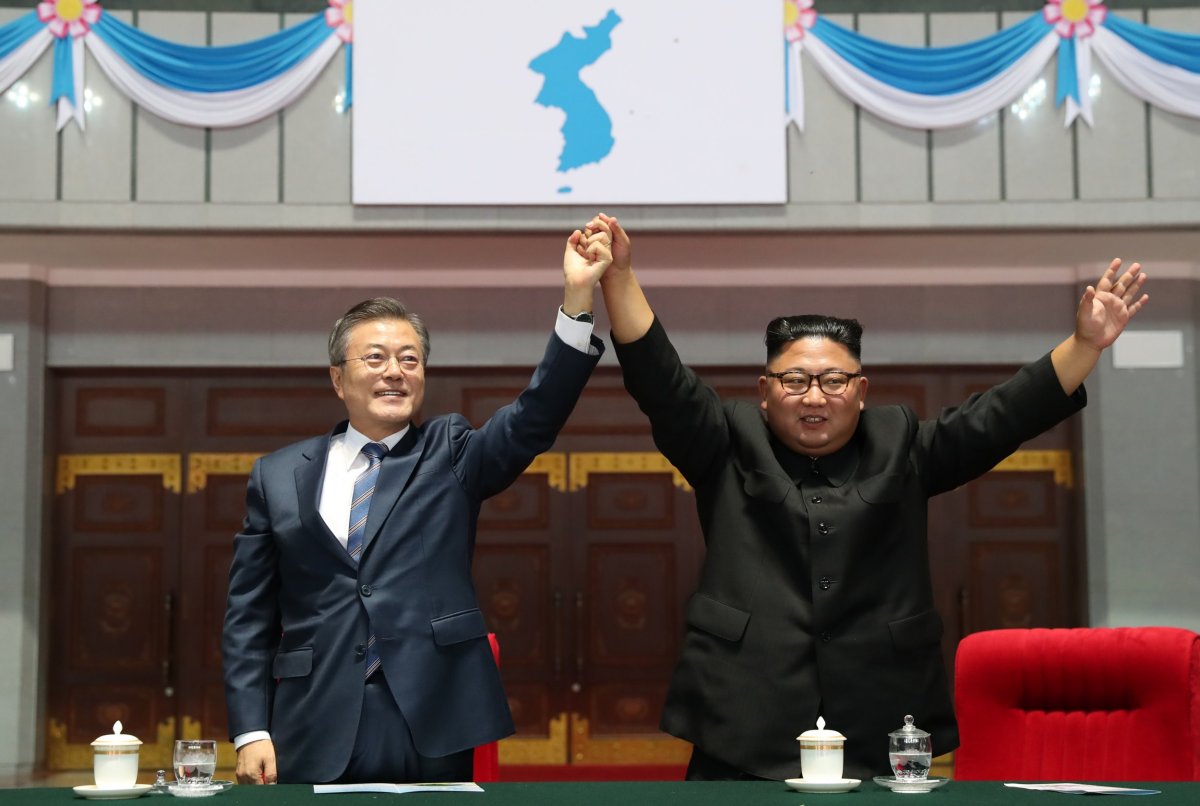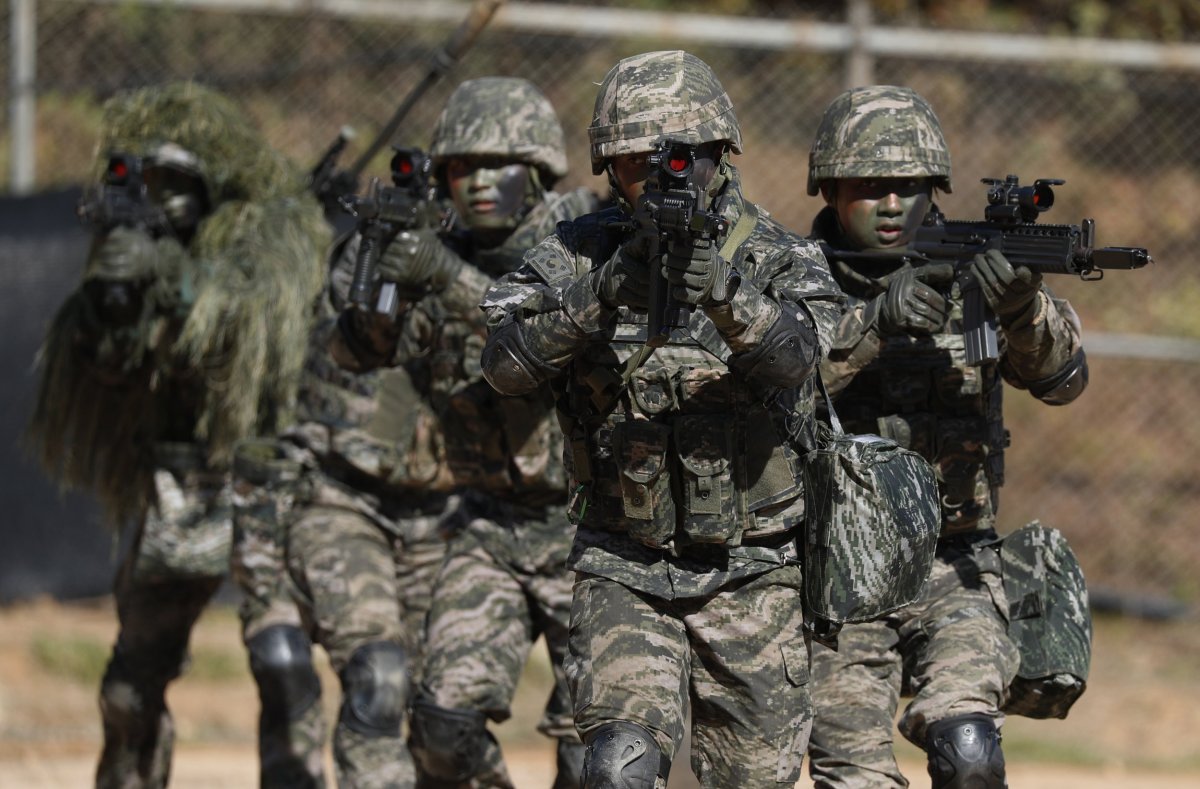The best bet to reunify the Korean Peninsula would be to adopt a peaceful approach, according to a recent study released by a leading think tank as the two Koreas undergo a historic warming of ties.
The RAND Corporation, a U.S. government-funded research center based in California, published on Wednesday a rundown of "Alternative Paths to Reunification" for North Korea (officially the Democratic People's Republic of Korea) and South Korea (officially the Republic of Korea) by senior international and defense researcher Bruce W. Bennett. The study, which was prepared for the Seoul-based Korea Foundation, outlined three major scenarios that could lead to North and South Korea reuniting: a second outbreak of war, the collapse of the Kim dynasty and a peaceful process controlled jointly by both governments.
"War could lead to ROK/US conquest of North Korea, North Korean conquest of the ROK, or no unification," Bennett wrote in the report. "A collapse of the North Korean regime could lead to ROK/U.S. intervention to achieve unification, a negotiated unification with the successor regime, or no unification."
Bennett continued, "A peaceful unification could be dominated by the ROK, dominated by North Korea, achieved by full cooperation between the ROK and the North, or attempted by cooperation that creates a confederation that the North might actually dominate."

Since being split by World War II victors the Soviet Union and the United States, the Korean Peninsula has been divided along a Cold War–era ideological conflict. Shortly after their establishment, North Korea (backed by the Soviet Union and China) and South Korea (supported by a U.S.-led United Nations Command) went to war from 1950 to 1953, which ended in a stalemate and no official peace treaty.
For the second half of the 20th century, both sides exchanged hostile rhetoric suggesting they foresaw the eventual reunification of the peninsula under their respective terms. In 2000, however, the two leaders of both sides came together to officially adopt a policy of peaceful reunification as outlined in the June 15 North-South Joint Declaration. A second meeting in 2007 affirmed this view, but nuclear-fueled tensions continued to dominate for much of the following decade.
However, since North Korean supreme leader Kim Jong Un reached out to South Korean President Moon Jae-in at the beginning of 2018, there were a record three more inter-Korean summits. President Donald Trump endorsed Kim's vow to abandon the nuclear weapons his government has long held dear to its survival. North and South Korea have also taken major steps toward peace. With inter-Korean personnel and the U.S.-led U.N. Command having completed disarming the Joint Security Area of the world's most heavily fortified border, the possibility of a true reunification has been repeatedly raised.
Moon appeared particularly enthusiastic about moving forward with the peace process, even as the U.S. expressed reservations. Seven decades of separation have created major differences between Seoul and Pyongyang. As Bennett pointed out, "a peaceful unification would be preferable, but the societal and political cultures of the two countries are so different that it is difficult to imagine how a full unification could be peacefully achieved.
"Both Koreas dream of unification, although the content of each dream appears to be quite different. Both seem to hope that a unified Korea might rise from a middle power to a major power and give Koreans a better place in the world. But the differences between the two Korean societies and governments would make a peaceful unification difficult to achieve. Indeed, a peaceful unification might proceed only as far as a confederation before the two sides recognize that one or the other is likely to be a loser in a unification: A win-win outcome for the two governments does not seem to exist," continued Bennett.
Experts estimated that a war between North and South Korea could kill up to 1 million people— and that's if it didn't go nuclear. A number of U.S. and foreign officials warned about the catastrophic effects of such a conflict. With a rare détente now in place, Bennett laid out a potential scenario for a cooperative, peaceful reunification.

"Conceptually, North and South Korea could enter into a confederation in which the vast majority of governmental functions (especially local government) remain separate, but some degree of coordination or integration is arranged between the North and South. This integration could then gradually increase over time, although it seems likely that it would take years and possibly decades before anything close to full unification would be possible along such a path," Bennett wrote.
The pitfalls of such a move would be that one government may dominate the other. Should North Korea dominate with its iron grasp on information flow and military prowess, Bennett said, "this path appears relatively stable for as much as perhaps five to ten years, assuming that South Korea accepts it in the first place," a situation he viewed as unlikely. Should South Korea take the lead with its larger population and thriving economy, "the Kim family could be overthrown once North Korean elites become more comfortable operating with the ROK government."
Bennett thought the collapse of the Kim dynasty was perhaps the most likely path toward achieving true reunification, and recommended that the U.S. and South Korea prepare for such a scenario. Nevertheless, he warned that such an event could lead to Chinese intervention and potential conflict. In any case, he argued that "South Korea must avoid using a major war to obtain unification, even in the case of a DPRK regime collapse; the cost would simply be too high."
Uncommon Knowledge
Newsweek is committed to challenging conventional wisdom and finding connections in the search for common ground.
Newsweek is committed to challenging conventional wisdom and finding connections in the search for common ground.
About the writer
Based in his hometown of Staten Island, New York City, Tom O'Connor is an award-winning Senior Writer of Foreign Policy ... Read more
To read how Newsweek uses AI as a newsroom tool, Click here.








